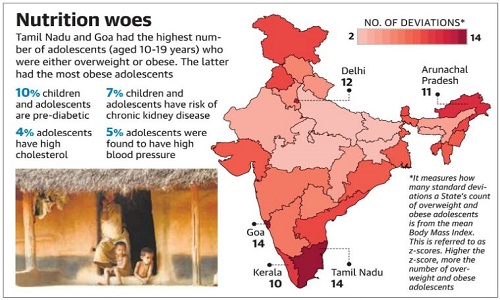The Union Ministry of Health and Family Welfare with the assistance of the United Nations Children’s Fund (UNICEF) conducted the first National Nutrition Survey. It was conducted between February 2016 and October 2018 to measure malnutrition, including micronutrient deficiencies through biochemical measures such as blood and urine samples, anthropometric data as well as details of non-communicable diseases such as diabetes, hypertension, cholesterol and kidney function in children and adolescents. Coverage
Coverage
- The survey covered more than 1,20,000 children and adolescents in rural and urban areas by evaluating the Micro nutrient deficiencies, Subclinical inflammation, Worm infestation, Overweight or obesity, Cardio – metabolic risks with the Clinical Development Services Agency (CDSA) as the monitoring agency.
- A total of 1.12 lakh children and adolescents (0-19 years) were surveyed for height and weight measurements and 51,029 children (1-19 years) for biological samples.
Findings
- For the first time, survey proved the coexistence of obesity and under nutrition.
- The study found prevalence of indicators of non-communicable diseases alongside indicators of undernutrition shown by various National Family Health Surveys (NFHS) such as stunting, wasting and underweight.
- Around 10% of children in the age group of 5 to 9 years and adolescents in the age group 10 to 19 years are pre – diabetic. 5% of them were overweight and 5% suffered from blood pressure.
- Tamil Nadu and Goa had the highest number of adolescents (aged 10-19) who were either obese or overweight.
- Goa had the most obese adolescents.
- A quarter of 5-9 and 10-19 year-olds were thin for their age.
- 4% adolescents have high cholesterol.
- 7% of children and adolescents have risk of chronic kidney disease.
- One in five children in the age group 5 to 9 years were stunted.
About malnutrition:
It is a condition that results from eating a diet in which one or more nutrients are either not enough or are too much such that the diet causes health problems. It may involve calories, protein, carbohydrates, vitamins or minerals. Not enough nutrients is called undernutrition or undernourishment while too much is called overnutrition.
About Ministry of Health and Family Welfare:
♦ Formed: 1976
♦ Minister In-charge: Dr Harsh Vardhan (Constituency: Chandni Chowk, New Delhi)
About UNICEF:
♦ Headquarters: New York, US
♦ Executive Director: Henrietta Holsman Fore




